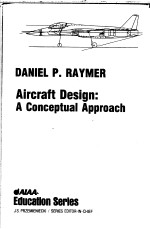图书介绍
Aircraft design:a conceptual approachpdf电子书版本下载

- Daniel P.Raymer 著
- 出版社:
- ISBN:0930403517
- 出版时间:未知
- 标注页数:745页
- 文件大小:26MB
- 文件页数:759页
- 主题词:
PDF下载
下载说明
Aircraft design:a conceptual approachPDF格式电子书版下载
下载的文件为RAR压缩包。需要使用解压软件进行解压得到PDF格式图书。建议使用BT下载工具Free Download Manager进行下载,简称FDM(免费,没有广告,支持多平台)。本站资源全部打包为BT种子。所以需要使用专业的BT下载软件进行下载。如 BitComet qBittorrent uTorrent等BT下载工具。迅雷目前由于本站不是热门资源。不推荐使用!后期资源热门了。安装了迅雷也可以迅雷进行下载!
(文件页数 要大于 标注页数,上中下等多册电子书除外)
注意:本站所有压缩包均有解压码: 点击下载压缩包解压工具
图书目录
Chapter 1. Design—A Separate Discipline 1
1.1 What Is Design? 1
1.2 Introduction to the Book 1
Chapter 2. Overview of the Design Process 3
2.1 Introduction 3
2.2 Phases of Aircraft Design 4
2.3 Aircraft Conceptual Design Process 7
Chapter 3. Sizing from a Conceptual Sketch 11
3.1 Introduction 11
3.2 Takeoff-Weight Buildup 11
3.3 Empty-Weight Estimation 12
3.4 Fuel-Fraction Estimation 14
3.5 Takeoff-Weight Calculation 23
3.6 Design Example: ASW Aircraft 24
Chapter 4. Airfoil and Geometry Selection 33
4.1 Introduction 33
4.2 Airfoil Selection 33
4.3 Wing Geometry 47
4.4 Biplane Wings 65
4.5 Tail Geometry and Arrangement 67
Chapter 5. Thrust-to-Weight Ratio and Wing Loading 77
5.1 Introduction 77
5.2 Thrust-to-Weight Ratio 78
5.3 Wing Loading 84
5.4 Selection of Thrust-to-Weight and Wing Loading 99
Chapter 6. Initial Sizing 101
6.1 Introduction 101
6.2 Rubber-Engine Sizing 102
6.3 Fixed-Engine Sizing 108
6.4 Geometry Sizing 109
6.5 Control-Surface Sizing 113
Chapter 7. Configuration Layout and Loft 117
7.1 Introduction 117
7.2 End Products of Configuration Layout 117
7.3 Conic Lofting 123
7.4 Conic Fuselage Development 129
7.5 Flat-Wrap Fuselage Lofting 135
7.6 Circle-to-Square Adapter 136
7.7 Fuselage Loft Verification 137
7.8 Wing/Tail Layout and Loft 139
7.9 Aircraft Layout Procedures 149
7.10 Wetted Area Determination 150
7.11 Volume Determination 152
Chapter 8. Special Considerations in Configuration Layout 155
8.1 Introduction 155
8.2 Aerodynamic Considerations 155
8.3 Structural Considerations 158
8.4 Radar Detectability 165
8.5 Infrared Detectability 170
8.6 Visual Detectability 171
8.7 Aural Signature 171
8.8 Vulnerability Considerations 172
8.9 Crashworthiness Considerations 174
8.10 Producibility Considerations 175
8.11 Maintainability Considerations 179
Chapter 9. Crew Station, Passengers, and Payload 181
9.1 Introduction 181
9.2 Crew Station 181
9.3 Passenger Compartment 185
9.4 Cargo Provisions 186
9.5 Weapons Carriage 188
9.6 Gun Installation 191
Chapter 10. Propulsion and Fuel System Integration 193
10.1 Introduction 193
10.2 Propulsion Selection 193
10.3 Jet-Engine Integration 196
10.4 Propeller-Engine Integration 220
10.5 Fuel System 226
Chapter 11. Landing Gear and Subsystems 229
11.1 Introduction 229
11.2 Landing Gear Arrangements 229
11.3 Tire Sizing 233
11.4 Shock Absorbers 239
11.5 Castoring-Wheel Geometry 246
11.6 Gear-Retraction Geometry 247
11.7 Seaplanes 250
11.8 Subsystems 252
Chapter 12. Aerodynamics 257
12.1 Introduction 257
12.2 Aerodynamic Forces 258
12.3 Aerodynamic Coefficients 262
12.4 Lift 263
12.5 Parasite (Zero-Lift) Drag 280
12.6 Drag Due to Lift (Induced Drag) 297
12.7 Aerodynamic Codes and Computational Fluid Dynamics (CFD) 305
Chapter 13. Propulsion 313
13.1 Introduction 313
13.2 Jet-Engine Thrust Considerations 315
13.3 Turbojet Installed Thrust 317
13.4 Thrust-Drag Bookkeeping 317
13.5 Installed-Thrust Methodology 318
13.6 Piston-Engine Performance 325
13.7 Turboprop Performance 331
Chapter 14. Structures and Loads 333
14.1 Introduction 333
14.2 Loads Categories 334
14.3 Air Loads 335
14.4 Inertial Loads 347
14.5 Power-Plant Loads 348
14.6 Landing-Gear Loads 348
14.7 Structures Fundamentals 349
14.8 Material Selection 354
14.9 Material Properties 357
14.10 Structural-Analysis Fundamentals 369
14.11 Finite-Element Structural Analysis 389
Chapter 15. Weights 385
15.1 Introduction 395
15.2 Approximate Group Weights Method 399
15.3 Statistical Group Weights Method 399
15.4 Additional Considerations in Weights Estimation 407
Chapter 16. Stability, Control, and Handling Qualities 411
16.1 Introduction 411
16.2 Coordinate Systems and Definitions 413
16.3 Longitudinal Static Stability and Control 414
16.4 Lateral-Directional Static Stability and Control 433
16.5 Stick-Free Stability 441
16.6 Effects of Flexibility 442
16.7 Dynamic Stability 443
16.8 Quasi-Steady State 446
16.9 Inertia Coupling 448
16.10 Handling Qualities 449
Chapter 17. Performance and Flight Mechanics 455
17.1 Introduction and Equations of Motion 455
17.2 Steady Level Flight 457
17.3 Steady Climbing and Descending Flight 463
17.4 Level Turning Flight 467
17.5 Gliding Flight 471
17.6 Energy-Maneuverability Methods 475
17.7 Operating Envelope 483
17.8 Takeoff Analysis 486
17.9 Landing Analysis 489
17.10 Other Fighter Performance Measures of Merit 491
Chapter 18. Cost Analysis 501
18.1 Introduction 501
18.2 Elements of Life-Cycle Cost 503
18.3 Cost-Estimating Methods 505
18.4 RDT&E and Production Costs 506
18.5 Operations and Maintenance Costs 510
18.6 Cost Measures of Merit (Military) 514
18.7 Airline Economics 514
Chapter 19. Sizing and Trade Studies 519
19.1 Introduction 519
19.2 Detailed Sizing Methods 519
19.3 Improved Conceptual Sizing Methods 520
19.4 Sizing Matrix and Carpet Plots 525
19.5 Trade Studies 532
Chapter 20. VTOL Aircraft Design 537
20.1 Introduction 537
20.2 VTOL Terminology 538
20.3 Fundamental Problems of VTOL Design 538
20.4 VTOL Jet-Propulsion Options 541
20.5 Vectoring-Nozzle Types 547
20.6 Suckdown and Fountain Lift 551
20.7 Recirculation and Hot-Gas Ingestion 552
20.8 VTOL Footprint 553
20.9 VTOL Control 554
20.10 VTOL Propulsion Considerations 555
20.11 Weight Effects of VTOL 556
20.12 Sizing Effects of VTOL 557
Chapter 21. Conceptual Design Examples 559
21.1 Introduction 559
21.2 Single-Seat Aerobatic 559
21.3 Lightweight Supercruise Fighter 603
Appendix A 658
A.1 Conversion Tables 658
A.2 Standard Atmosphere and Shock Tables 660
A.3 Airfoil Data 687
A.4 Typical Engine Performance Curves 717
A.5 Design Requirements and Specifications 731
References 735
Subject Index 739
精品推荐
- Northanger Abbey(1818)
- Emma(1815)
- Sense And Sensibility(1811)
- Mansfield Park(1814)
- HUMANITIES THE EVOLUTION OF VALUES
- Pride And Drejudice(1812)
- English
- 企鹅经济学词典 经济学
- 大人的友情 河合隼雄谈友谊
- Computing Concepts
- Advanced Compilpr Design and lmplementation
- 中国商事法律要览
- Introduction to polymers
- CONFICT OF LAWS IN THE WESTERN SOCIALIST AND DEVELOPING COUNTRIES
- Measurement and Research Methods in International Marketing